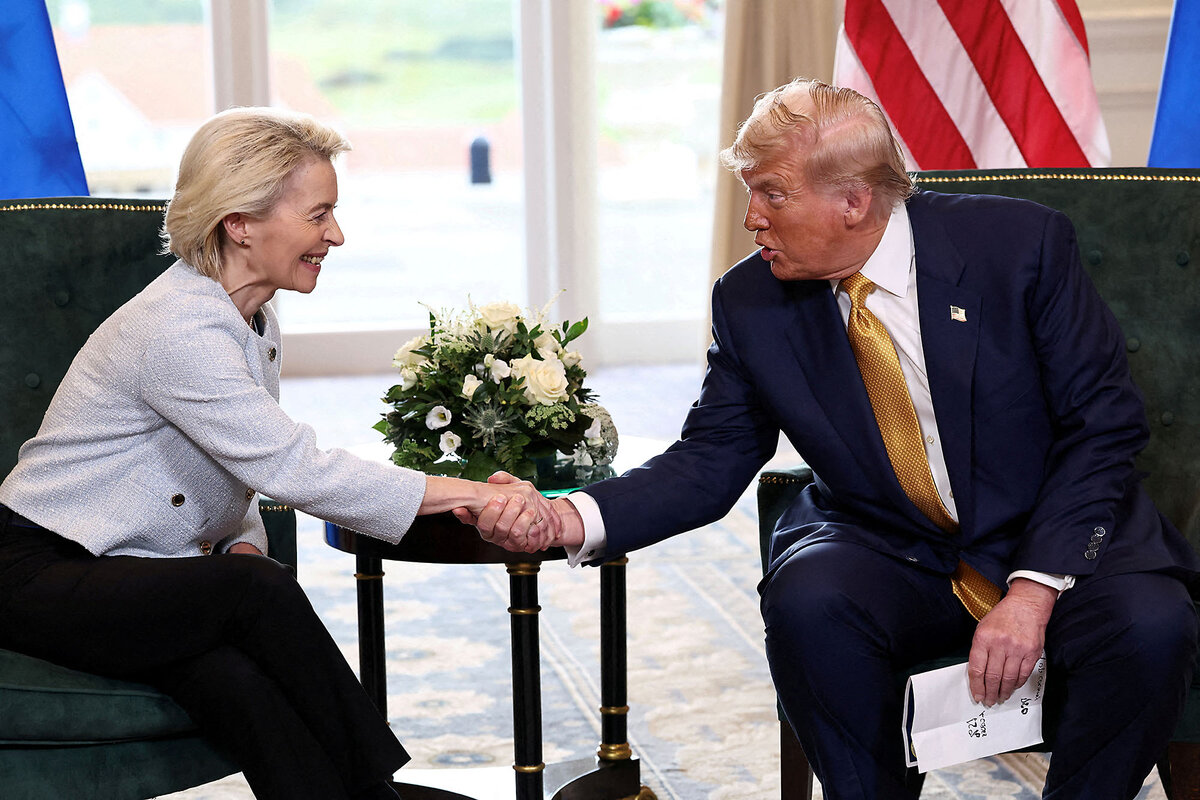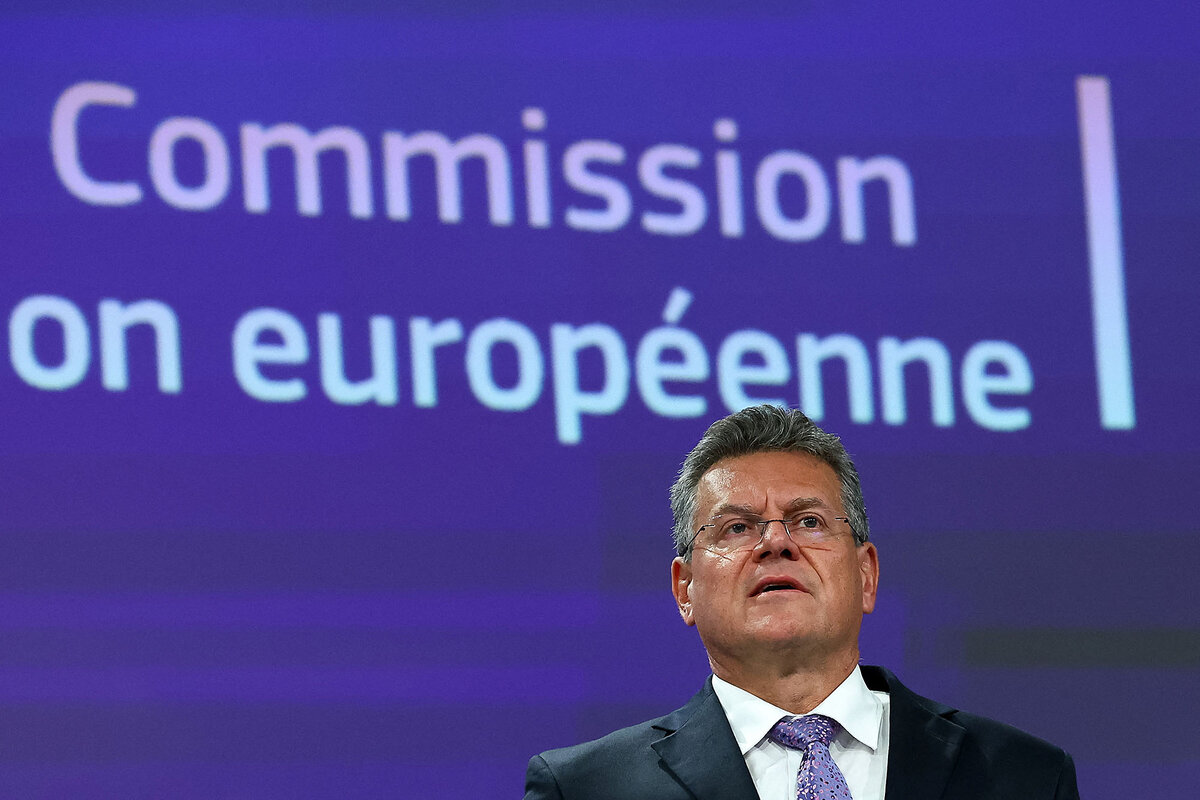Why Europe’s trade deal with the US might be better than it seems
Loading...
| Berlin
Since President Donald Trump began his second term in office, the European Union has steeled itself for what it sees as an existentially important battle. It would stand for the rules and organizations that brought stability and prosperity to the post-World War II era.
On Sunday, it lost one of the biggest clashes to date. The question is whether that was a toothless capitulation, or a bitter requirement to reset a crucial alliance.
In a new trade deal, the EU accepted a 15% tariff on many exports to the United States. As a deal, it is a bad one for Europe, experts say, though the impact should not be too severe.
Why We Wrote This
After the new U.S.-EU trade deal was announced Sunday, many Europeans felt they had come out on the losing end. But analysts say that it needs to be seen in the context of Mr. Trump’s broader relationship with Europe.
But in reality, it is much more than a trade deal.
Months ago, Mr. Trump’s support for Ukraine was barely lukewarm, and he spoke of the EU with undisguised disgust. An alliance was fast becoming a rivalry. In agreeing to Sunday’s deal, EU leaders clearly think they have turned a corner, seeing the deal as a tax for good relations: unfortunate, but necessary.
But at what cost? To many Europeans, perhaps the greatest loss is to the continent’s increasingly battered sense of its own value. Mr. Trump effectively leveraged uncertainty and raw power to advance his vision of American self-interest, and the EU did nothing to stop him.
Europe is not alone, of course. A slew of U.S. tariffs is set to take effect on Aug. 1, so many nations are negotiating better terms. For example, Japan and Vietnam have recently agreed to similar deals. But Europe had long thought it was girding to fight back. When relations with the U.S. were at their worst, the EU’s public statements were ones of confidence, even defiance. Now, there is a deflating sense that alliance with the U.S comes with humiliation.
Not playing by the rules
The immediate consequences are hard to judge. Europe has a breaking point and will not accept American strong-arm tactics forever. But it has few good levers.
The longer-term consequences are clearer. Europe’s decades-long integration with the U.S. – even dependence on it – is now repeatedly being turned against the continent as a bargaining chip. European leaders are increasingly eager to ensure that situation ends.
“There was this self-perception that the EU is a heavyweight that can go toe-to-toe with the U.S., and that has been the case in previous situations,” says Aslak Berg of the Centre for European Reform in London. “But the U.S. has not chosen to play by the rules anymore.”
By “the rules,” Mr. Berg is referring to two tenets of the World Trade Organization. First, that tariffs should only be imposed under certain conditions. And second, that unless one nation has a free trade agreement with another, it has to treat all nations the same. These rules are aimed at maintaining predictability and fairness, and Mr. Trump has wholly ignored them.
He argues that the U.S. is merely trying to rebalance what he considers unfair trading relationships. But his tactics have given the U.S. an obvious advantage. “You can use U.S. market access as a tool,” Mr. Berg says.
Europe’s one significant countermeasure is the Anti-Coercion Instrument, more entertainingly known as the “trade bazooka.” It gives the EU wide scope to levy huge tariffs in response to an economic activity seen as coercive. Last week, German Chancellor Friedrich Merz suggested the EU should “consider the use” of the bazooka.
But even when the Anti-Coercion Instrument is not in play, EU nations can struggle to find consensus. France, one of the sternest critics of the new deal, panicked when the EU proposed raising tariffs on U.S. wine and bourbon. Alcoholic beverage makers there worried about retaliation. Other countries' tastes and industries present similar potential wedges against EU action.
“There was never a constituency for a trade war with the U.S.,” Mr. Berg says. “There was only a constituency for tough rhetoric.”
Moving the transatlantic relationship
Perhaps more important to the EU’s muted response are factors beyond the economy. For one, the Trump administration made the unconventional decision to link trade policy to security policy. Europe felt it had to accept the tariffs or risk losing U.S. support in Ukraine.
The deal “represents the current balance of power, especially on defense,” says Andreas Baur, an expert at the ifo Center for International Economics in Munich. “This is about needing the U.S. for security.”
More broadly, Mr. Trump’s attitude toward the EU has shifted. The scene Sunday of Mr. Trump sitting next to European Commission President Ursula von der Leyen would have been unthinkable months ago. “There was a sense that Europe was being targeted. There was an animus directed at the EU and liberal democracy,” says Andrew Small, an analyst with the German Marshall Fund.
The poor terms of the trade deal, he adds, “were a price overall to get the transatlantic relationship where it was needed.”
Europe wants to avoid this situation in the future. That begins with historic new spending on defense. But it also includes the EU pushing more aggressively for its own trade deals, from South America to India. In one scenario, “the EU sees this moment of bitterness, and we try to become more independent, and that makes us a better partner,” says Mr. Baur of ifo.
But he worries that years of acrimony will leave a mark. “The negative is that the long-term trust in the U.S. is extremely undermined,” he adds. “The coming generation of EU leaders will remember these situations.”
One conclusion, however, is inescapable, he says, and offers some practical hope. “Having a strong transatlantic alliance – there’s no alternative to that.”









